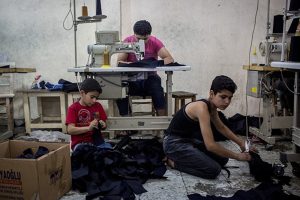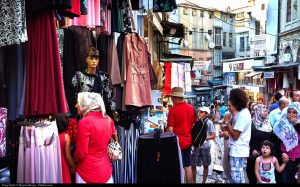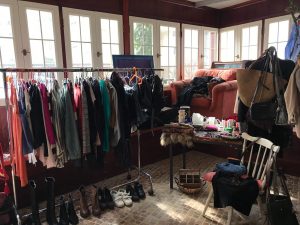The holiday season is just around the corner. Ramadan and Eid are times when we celebrate and gather as relatives. Needless to say, material commodities such as delicious food, generous gifts, and new clothes are central aspects of this celebration. We love to share our abundance with our relatives. It makes us feel a certain sweetness of life that counterbalances the hardship of fasting. However, there is a dark side to this sharing of abundance that we often overlook or downright choose to ignore: our excessive consumption.
Festive seasons and overconsumption have become inseparable. Not only is there an increased spending on food, but there is also a generalized consumption behavior. A study conducted on consumer trends found that overall consumption and spending increase by 53 percent in Arab countries during the holy month.*1
The lifespan of clothing is becoming shorter, especially for clothes bought for special occasions that are typically worn only once or twice. A lot of resources are used in the manufacturing of new clothes – raw material, water, energy, and chemicals – making the fashion industry one of the most polluting industries in the world.
Shops in Palestine are filled with mass imported clothes from countries such as Turkey, China, and Bangladesh. Working conditions for garment workers in these countries are rarely favorable. This makes fashion consumption not only an environmental issue but an ethical one too. Take the textile industry in Turkey as an example. Many of the clothes found on the Palestinian market are imported from Turkish manufacturers who have been reported to exploit Syrian refugees in garment factories.*2 Textile workers are also exposed to hazardous conditions, which leads to serious health issues.*3
The domination of cheap imported clothes has resulted in small local clothing brands being outcompeted on the market, not to mention the tailor shops that have almost become extinct.
Fashion shouldn’t be a hazard to the environment, and there is a range of sustainable options for consuming it. Supporting local responsible producers that value transparency is one such option. BabyFist, for example, is a clothing line based out of Palestine that creates fashion for a social cause and the empowerment of women. At the same time, it supports local Palestinian producers by manufacturing their apparel across the West Bank and Gaza.
Taita Leila is another local brand that counters the values of fast fashion. The company values traditions and handwork by incorporating Palestinian embroidery (tatreez) into its clothes and employing local women as embroiderers.
Buying second-hand goods is another sustainable alternative to consuming. Located in downtown Ramallah, Dukkan is a second-hand shop that sells everything from clothing to children’s toys at budget prices. It aims to tackle the challenges related to fast fashion, especially fashion waste that ends up in landfills and contributes to pollution.*4
There are several ways to prevent our clothing from ending up in landfills. Outgrown clothes, for both adults and children, can be donated to various charity organizations and orphanages across the country. Or why not bring back the lost Palestinian tradition of handwork by having your clothes tailor-made at one of the few remaining tailors in town?
Through her blog Zero Waste Palestine, Najla sheds light on climate change-related issues and promotes sustainable and waste-free practices for Palestinian households.
*1 Tom Joyce, “Ramadan brings consumption spike,” Fruitnet, June 2016, available at https://bit.ly/2ZHWHlg.
*2 Marc Bain, Major fashion brands are trying to stop their factories in Turkey from exploiting Syrian refugees, April 2016, available at https://bit.ly/2vmPUzr.
*3 Globalization: When Fashion Kills, France 24, available at https://bit.ly/2IV8NkP.
*4 Dukkan was initiated by Dalia Association. All the income generated is put into supporting community development in Palestine. For more information, visit www.dalia.ps.




